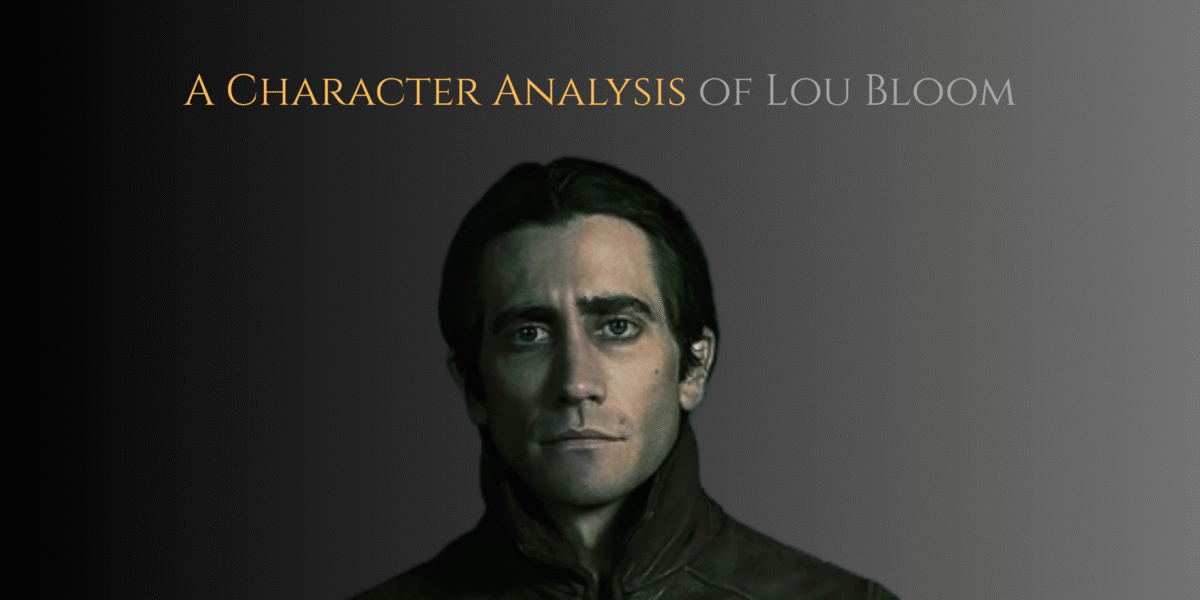Lou Bloom (from Nightcrawler, played by Jake Gyllenhaal) is a unique portrayal of a psychopath. He is indeed a morally vacuous character. But more than that, he is the embodiment of a mind conditioned to see the world – and himself – as machinery to be optimized.
Not unlike the popular perception of many incredibly successful entrepreneurs in the world.
In a way, he is closer to other ‘successful’ villains portrayed in TV too, characters such as Walter White. However, Bloom also has an interesting relationship with emotional expression and relationships with other people – even those who he wants to be close to.
The following analysis explores Lou through seven intertwined lenses. I’ve gone through his thought processes and behaviors around self-analysis, isolation, risk-seeking, learned behavior, confidence, grandiosity, and cultural commentary. Each of these concepts have been illustrated with his own words, so that we don’t just describe his psychology but actually hear it.
Later on in this character analysis, I also provide a personality profile for Lou through the ocean model of personality and his most probable MBTI type.
So, let’s begin!
Lou Bloom’s Background
Little is known about Lou’s early life – a deliberate omission by the film that deepens his enigma. The absence of personal history, family ties, or genuine friendships suggests chronic social isolation long before the events of the film. He comments during his ‘date’ with Nina (the news director at the station he is selling his footage to) that he “lives north of the valley” and “doesn’t get many calls”. This hints at a solitary existence devoid of meaningful social or emotional attachments. This vacuum of relational experience appears to have shaped his instrumental understanding of others: people are not companions, but potential assets or obstacles.
What we do know, however, is that Lou supports his living by selling off items. He acquires these items suspiciously, most probably stealing them from their owners while keeping a low profile. This already shows that he can commit actual theft while remaining under the radar. Individuals with antisocial personality disorder often exhibit this behavior while showing limited amount of grief or guilt – as can be noted in Lou’s behavior of, well, not dwelling too much on the fact that he stole something.
It could also be that the movie purposely doesn’t disclose his misconduct as most of it is implied and off-screen, shrouding Lou in further mystery.
Lou Bloom’s Psychological Profile
1. Cognitive Dominance
Self-Analysis
Lou doesn’t simply act analytically toward others – he also subjects his own life to the same cold logic. His self-definition emphasizes traits like persistence and hard work:
“Who am I? I’m a hard worker. I set high goals and I’ve been told that I’m persistent.”
He also notes success as a form of ‘lottery’ – or a game of chance. As he says,
“My motto is if you want to win the lottery, you’ve got to make money to buy the ticket.”
Lou also knows that good things don’t come simply because one hopes – they require effort and cost. However, considering ‘success’ as a lottery is quite ambitious – and perhaps even grandiose – especially since success doesn’t often come overnight.
Nevertheless, the statement shows that Lou is aiming big, implying that he sets standards for himself that are difficult and expectations of himself – and thus life, and others – quite high.
Another thing of note is that Lou remains emotionally stable even under pressure. Anxiety, guilt, or self-doubt are rarely visible. His clarity under pressure is paired with rational self-evaluation:
“If you’re seeing me, you’re having the worst day of your life.”
It is not a boast but a statement of profession. He acknowledges the awfulness in his footage and in himself, but he accepts it. In fact, he views that horror as his function, not something to be ashamed of.
Confidence and Grandiosity
Lou’s confidence is not performative cheer; it is conviction. He doesn’t try to fake being liked. He does try to be respected. Most of all, he values results more than relationships, performance more than intimacy.
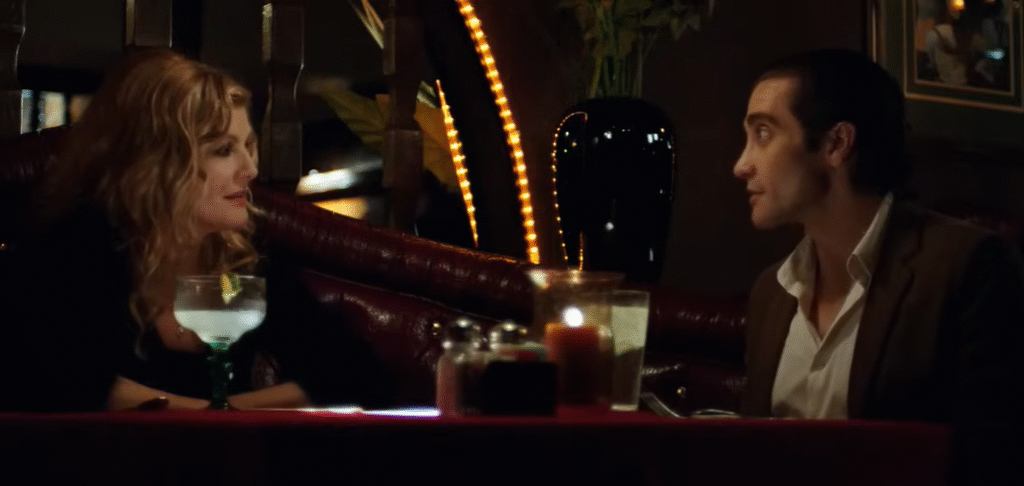
A very telling incident is after he meets Nina following their date when she seems to be evading his request for intimacy. When Lou returns with an exclusive footage – that could be ‘valuable’ for the ratings of KWLA – he reminds Nina of his proposition, to which she says that she appreciates him as a work partner.
To this he replies:
“You don’t work with me, you’re someone I sell to.”
That epitomizes his associations – not as collaborators or peers, but exactly what their individual, secluded and utilitarian role is. This further contributes to and is a symptom of his egocentric emotional detachment from others.
It also indicates his sense of grandiosity. He appears to consider himself as a very valuable asset to KWLA and a potential asset to all the people who tried to sell to or get a job from. This is not exactly untrue as he often does deliver, but what enables this grandiosity is his ability to get away with illegal activity.
If we go further into his thought processes, his grandiosity seems to be tied to this: belief in the “entrepreneurial self,” belief that competence, relentless work, and savvy – irrespective of ethical problems – matter more than birth or sentiment.
He wants credit, as he says in the same scene I just described:
“from here on … I want my work to be credited by the anchors … the name of my company … that’s how it should be said.”
This assertiveness is what separates Lou Bloom from someone with Schizoid Personality Disorder (a psychiatric disorder featuring patterns of social isolation and inhibited verbal or emotional expression).
Intellectualization and Emotional Detachment
Lou Bloom’s emotions are subordinated rather than expressed; when he laughs, there’s a near-delay, as though he’s assessing whether the emotional response is appropriate or warranted.
Take for example how he laughs at a funny scene playing on the TV set while he is ironing his clothes. It takes him a significant moment to laugh at it – even while he is smiling before.
Another example of his delayed emotional expression is when Joe Loder tries to get Lou to work for him. While Loder is clearly too insistent on getting him on board, Lou doesn’t show any hint of anger at him. When pushed further, he spells out his entire thought process:
“I feel like grabbing you by your ears right now and screaming, ‘I’m not fucking interested!’ Instead, I’m going to drive home and do some accounting.”
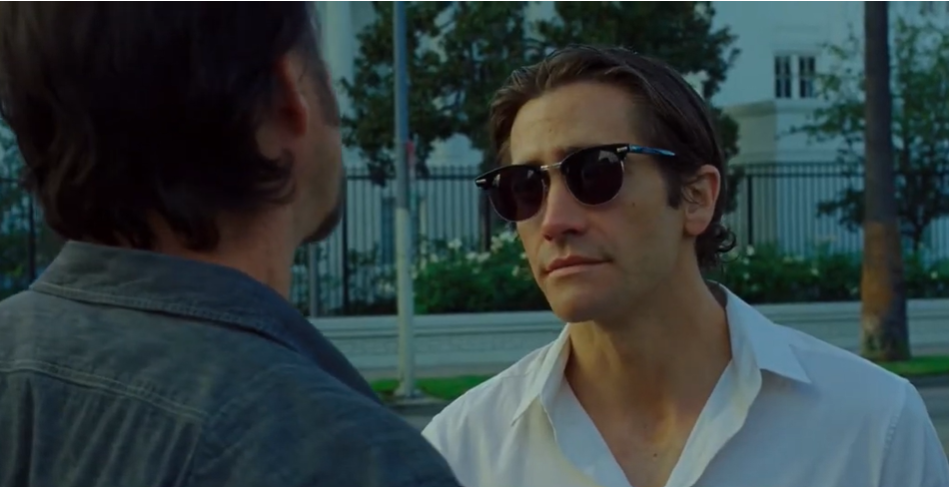
When confronted with frustration, he often moves into action rather than self-pity. That quote shows both impulse and control: he feels something visceral, but instead of lashing out, he returns to strategy.
He delivers this line nonchalantly with no increase in his tone of voice or any visible signs of anger. Interestingly, this delayed emotional response is common in people with Asperger’s syndrome (now more commonly known as mild autism). Lou also exhibits other symptoms of autism which I discuss further below in this analysis.
2. Social Aloofness
Lou’s social life is nearly non-existent before the story begins, and after, all relationships are instrumental.
He avoids discussing his past. When asked about where he lives or who calls him, he hints that he lives “north end of the valley,” that “no one calls,” that “no one lives there.” These nebulous details, with no backstory or emotional history, reinforce that Lou has built his identity around absence and rational construction, not inherited experience or relational depth.
When I first watched the movie, I noted how Lou seemed to have certain Schizoid traits that I mentioned earlier. The feature of inhibited social communication is also found in Autism. However, while Lou has features of both disorders, there is not enough evidence to indicate he could be diagnosed with either. Rather, the aspects of his psychology I am about to dive into show how he is indeed very anti-socially oriented.
Transactional Relationships
His interactions with Nina aren’t deliberate attempts at warmth; he offers business propositions. His approach is exemplified in his negotiation with her. I’ll further flesh out a quote that I brought up above:
“Now I like you, Nina … But you have to understand, fifteen thousand isn’t all that I want … Starting now, I want my work to be credited by the anchors … The name of my company is Video Production News … I want these things … when I say that I want these things, I mean that I want them and I don’t want to have to ask again.”
His relationship with Rick also demonstrates this transactional framework. He hires Rick under the guise of mentoring, calling the job an “internship,” but he also leverages Rick’s need for money, promising future rewards to ensure compliance.
Lou doesn’t learn social interaction organically; he studies, scripts, practices. He sees every sentence as a negotiation, every relationship as territory to be claimed.
A friend is a gift you give yourself.
In sum, Lou’s philosophy is utilitarian to the core, forming the basis of a transactional style of attachment with others where emotional connection means very little. This is quite common in individuals with clinical narcissism. Empathy doesn’t just take a back seat here – Lou doesn’t once offer a human connection that does not serve his own goals throughout the movie.
However, he can seem fair in his transactions with those who are higher in the social ladder. The same cannot be said for his behavior with those who work under him or are dependent on him.
This brings us to Machiavellianism.
Machiavellian Strategy
One of his most revealing lines is:
“What if my problem wasn’t that I don’t understand people but that I don’t like them?”
That moment draws a sharp line: Lou is not merely socially awkward – he is intentionally disconnected. This is what I meant when I said that Lou is not socially aloof; he is oriented to social interactions in a way that is based on subjective morality that could frequently go against social norms.
A hallmark indicator of psychopathy rather than being autistic or schizoid.
Lou also has a penchant for lying or fabricating evidence. For example, Lou clearly lies to Rick:
“I run a successful TV news business. Maybe you saw my item this morning… Do you have a cellphone? Does it have GPS?”
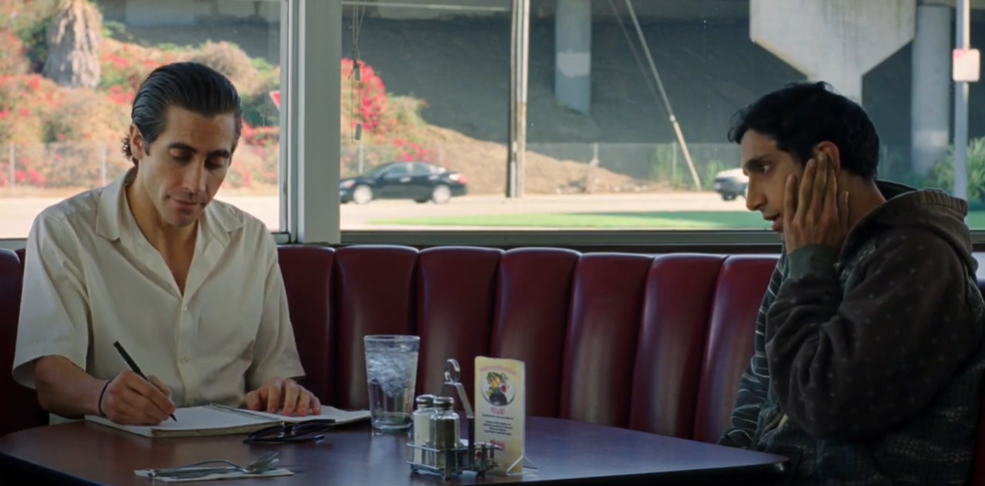
While Machiavellianism doesn’t specifically involve lying, it does involve manipulation for instrumental power.
These are markers of evaluating others by what they can contribute, not what their stroy is or who they really are.
Another example of his Machiavellian strategy is his concept of FEAR – false evidence appearing real, which he explains to Rick in their earlier interactions. He demonstrates this by meddling with evidence for a more emotional or optical effect. This is shown when he relocates the pictures of the family on the fridge closer and above the bullet holes at the crime scene of a house that was shot up. Even more, sinisterly, he moves the body of a person under the car following an accident in order to get a clearer shot of it in the headlights of the vehicle.
Before we go to what motivates and drives Lou Bloom’s behavior, it is important to see his possible psychiatric diagnosis.
Lou Bloom’s Diagnosis
Lou exhibits various signs of mental health issues. His emotional expression seems to be robotic and contrived rather than fluid. Moreover, he also has a penchant for seeking excitement and risky endeavors. He also spends most of his time alone.
This offers a variety of possible clinical diagnoses.
Is Lou Bloom Autistic?
As discussed earlier, Lou seems to have problems with social communication – often not expressing his point with emotional depth. This shows up in how what he says doesn’t seem to be reflected in his verbal and non-verbal cues. He also can end up expressing extreme anger in certain situations when his needs are not being met.
However, he does not display repetitive behaviors. This is a core feature of autism which is missing in Lou’s behavioral profile. So, I’d say that he displays features of autism – but he is not autistic – as a clinician.
Here are a couple of tables for the presence of features of autism.
Criterion A – Social Communication Deficits
| Criterion | Description | Presence |
|---|---|---|
| A1 | Deficits in social–emotional reciprocity | ✓ |
| A2 | Deficits in nonverbal communicative behaviors used for social interaction | — |
| A3 | Deficits in developing, maintaining, and understanding relationships | ✓ |
Criterion B – Restricted, Repetitive Behaviors
| Criterion | Description | Presence |
|---|---|---|
| B1 | Stereotyped or repetitive motor movements, use of objects, or speech | — |
| B2 | Insistence on sameness, inflexible routines, ritualized patterns | — |
| B3 | Highly restricted, fixated interests (abnormal intensity/focus) | — |
| B4 | Hyper- or hypo-reactivity to sensory input; unusual sensory interest | — |
Is Lou Bloom Schizoid?
Schizoid personality disorder is characterized by a pattern of behaviors which predominantly show asociality. Schizoid individuals prefer to spend most of their time alone, preferring not to socialize with people without much emotional dysfunction.
Lou seems to align with this disorder. He does not express emotions because he fears them or that others might hurt him. Rather, he does not feel the need to interact with them unless it is absolutely necessary. Moreover, Lou chooses jobs that allow him to operate alone. These are classic features of a schizoid personality.
Having said that, it is hard to imagine a person with a schizoid personality disorder to hire multiple people in a promising startup that he himself started.
I would say that earlier on in the series, Lou could have qualified comfortably for the diagnosis of schizoid personality disorder. However, by the end, this does not remain a disorder as he functions – at that point – more as an introverted entrepreneur.
Here is a table indicating the features that Lou has of schizoid personality disorder:
| Criterion | Description | Presence |
|---|---|---|
| 1 | Neither desires nor enjoys close relationships | — |
| 2 | Almost always chooses solitary activities | ✓ |
| 3 | Little desire for sexual experiences with others | ✓ |
| 4 | Takes pleasure in few, if any, activities | ✓ |
| 5 | Lacks close friends/confidants other than first-degree relatives | ✓ |
| 6 | Indifferent to praise or criticism | — |
| 7 | Shows emotional coldness, detachment, or flattened affect | ✓ |
Is Lou Bloom a Psychopath?
‘Psychopath’ is not exactly a diagnosis. What people usually refer to when they talk in clinical terms is the psychiatric diagnosis of antisocial personality disorder. Lou does not like people – something which he figures out and tells Rick in the middle of the film.
This antisociality is what makes Lou psychopathic. I would also argue here that Lou’s psychopathy is born out of his schizoid personality earlier on and a lack of emotional warmth from familial and social institutions.
There are also some positives of this psychopathy which help Lou become more social. An example is his transactional nature which allows him to negotiate better – even at the cost of relational depth.
All in all, this is a diagnosis that I am most confident in proposing, especially since Lou actually commits crime indirectly but intentionally.
Now a couple of tables for antisocial personality disorder:
Criterion A – Behavioral Symptoms
| Criterion | Description | Presence |
|---|---|---|
| 1 | Failure to obey laws; repeated acts grounds for arrest | ✓ |
| 2 | Deceitfulness: lying, conning, manipulation | ✓ |
| 3 | Impulsivity or failure to plan ahead | — |
| 4 | Irritability or aggressiveness | — |
| 5 | Reckless disregard for safety of self or others | ✓ |
| 6 | Consistent irresponsibility | — |
| 7 | Lack of remorse; rationalization of harm done | ✓ |
Criterion B – Other Requirements
| Criterion | Description | Presence |
|---|---|---|
| B | Age 18+ | ✓ |
| C | Evidence of conduct disorder before age 15 | Not known |
3. Motivations and Drivers of Behavior
Ambitions
I mentioned in Lou Bloom’s self analysis that Lou has a clear, rational picture of himself and he projects the same picture on to others and the world in general. He has a routine that largely involves work and some time spent leisurely watching TV. He also has a habit of bringing his work back home where he watches through his footage and sorts it out.
The film also indicates that he works long hours into the night. This shows how oriented he is towards his work and ‘getting ahead’.
Lou further implicitly understands the utility of psychology and other subjects such as business. He admits to watching motivational videos and has even taken a course in business.
These behaviors also indicate a habit to fixate for long amounts of time. This is an example of ‘locking in’, a feature of the psychology of entrepreneurs.
However, Lou’s fixation further isolates him from others on the emotional front, making his ambitions more egocentric than, perhaps, the average entrepreneur’s.
Risk-Seeking and Rationalized Thrills
Though calculated, Lou sometimes craves stimulation – when filming grotesque scenes or when speeding away from danger. These moments are rare but significant, because they strip back the mask of composure for a second.
For instance, during some gruesome filming he drags a body into better lighting to get a clearer shot, and his breathing becomes heavier. The visual suggests excitement more than horror. He rationalizes that action as necessary for a better product.
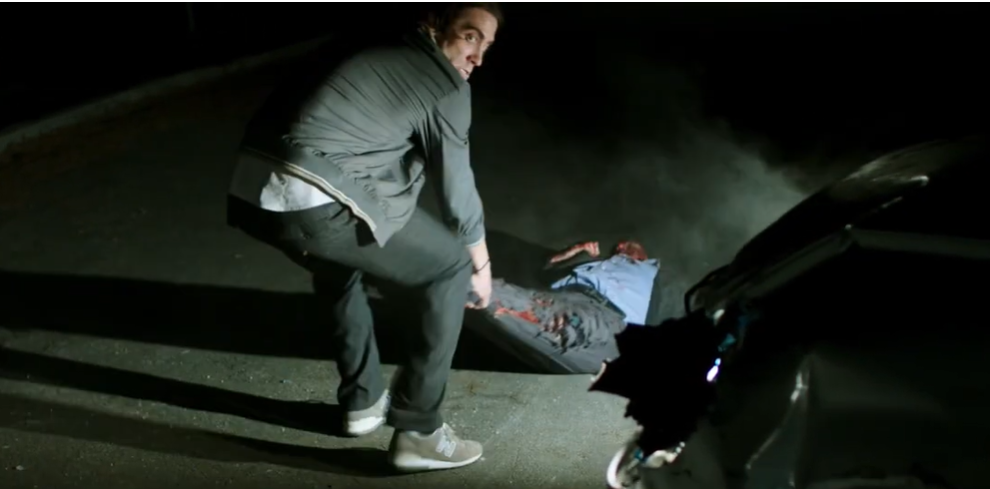
While speeding dangerously and being called out for it by Rick, he says:
“Get out of your head, Rick. It’s a bad neighborhood.”
His justification is: fear is irrelevant; what matters is outcome. Risk becomes part of business rather than something to avoid. In fact, fabrication also becomes part of business as the case with the FEAR concept.
Personality
First, I’ll explain Lou’s personality through the Big 5 personality traits. After that, I’ll let you in on Lou’s MBTI type – as I have perceived it as a clinical psychologist, based on his behaviors.
Lou Bloom’s Big 5 Personality Traits
1. Openness to Experience – Moderate to Low
Lou Bloom’s openness to experience is mixed. Intellectually, he is curious and highly analytical – traits associated with the intellect facet of openness. He studies human behavior and professional success with obsessive detail, memorizing business principles and adapting them to his work as a freelance videographer. This demonstrates a cognitive curiosity – the drive to understand and systematize, rather than to imagine or feel.
However, Lou’s aesthetic appreciation and imaginative depth are limited. His world is generally practical and functional, not creative. His red car and fashionable eyewear suggest some surface-level self-styling, but this reflects status management rather than aesthetic sensibility.
Moreover, Lou is dogmatic in belief; he doesn’t entertain alternate moral or philosophical positions. His rigid adherence to his own utilitarian logic – that effort and ambition justify all means – marks him as closed to emotional and ideological diversity.
Thus, Lou ranks moderate to low in openness: intellectually sharp but emotionally and aesthetically narrow.
2. Conscientiousness – Moderate to High
Lou exhibits strikingly high orderliness, discipline, and achievement-striving. His apartment is neat and minimalist, his speech rehearsed, and his professional conduct methodical. He works with surgical precision – scouting locations, managing time, and learning camera angles with obsessive consistency. He also maintains clear routines and personal rules, which sustain his illusion of control.
However, Lou’s conscientiousness is instrumental, not moral. While he values structure and discipline, his moral conscience is absent. He bends laws, manipulates people, and obstructs justice when necessary to achieve results. His version of “ethics” is performance-based. In actuality, what matters is that if the act produces efficiency or gain, it is justified.
In this sense, his conscientiousness aligns with compulsive order and ambition, not with social responsibility.
Thus, he falls on the moderate to high range, with moral selectivity as a key qualifier.
3. Extraversion – Low (with High Excitement-Seeking)
Lou is not sociable or warm. His demeanor is cool, measured, and often unsettlingly quiet. He shows little genuine joy or expressiveness, and his attempts at charm are mechanical – functional rather than spontaneous. He avoids small talk and engages only when interaction yields an advantage. These traits place him low on the gregariousness, warmth, and positive emotion facets of extraversion.
However, he is high in excitement-seeking, a facet of extraversion typically found in thrill-seekers and sensation-driven personalities. Lou’s arousal comes from risk, danger, and control – not from social stimulation but from adrenaline within what he does alone.
For example, as I quoted in the psychological profile, when he moves a corpse for a better shot his breathing quickens with excitement. This paradox – social introversion but high stimulation drive – gives him a predatory psychological tone.
He is cold, quiet, yet electrified by risk.
4. Agreeableness – Low
Lou Bloom’s interpersonal profile is defined by manipulativeness, emotional coldness, and a lack of empathy. He lies frequently, exploits others for gain, and views relationships as transactions.
His dynamic with Rick is revealing – Lou offers trust only to extract obedience, and later sacrifices him without hesitation once he does against Lou’s original arrangement of splitting the revenue. His relationship with Nina, too, is coercive; he leverages her professional dependence to force intimacy, demonstrating Machiavellian control rather than genuine connection.
He explicitly states his aversion to human warmth.
This admission encapsulates his low agreeableness – a rejection of empathy and social harmony. He has no altruistic motives, no moral guilt, and no genuine trust in others. Even his politeness is a tool, not an expression.
Therefore, Lou ranks very low in agreeableness, characterized by manipulative pragmatism and interpersonal callousness.
5. Neuroticism – Moderate to High
Despite his apparent composure, Lou’s control is brittle. Beneath his calm exterior lies a reactive temper and deep insecurity tied to status and dominance. When challenged – such as when Rick defies him or Nina resists his demands – he becomes hostile, aggressive, or threatening.
His outburst in the bathroom, where he smashes a mirror in frustration, further reveals his intolerance for loss of control and his fragile self-concept.
Lou’s impulsive acts – like altering crime scenes or racing dangerously through traffic – stem from emotional volatility masked by rationalization. He frames his outbursts as calculated, but the physiological signs (tension, anger, rapid breathing) betray underlying instability. His neuroticism is thus situational: he is steady under self-made rules but unravels when his dominance is questioned.
This puts him in the moderate-to-high neuroticism range, driven by hostility, vulnerability, and control anxiety.
Lou Bloom’s MBTI Type
At first glance, Lou Bloom appears to embody the traits of an ISTJ – structured, industrious, and highly conscientious. His routines, meticulous approach to work, and precise communication style all point to a personality grounded in order and self-discipline. However, a closer psychological reading reveals that this order is not intrinsic but constructed – a self-made system designed to impose logic on a chaotic inner world. Lou does not inherit structure from his environment, as an ISTJ would; he manufactures it from within. His sense of control is synthetic, not organic – a defense mechanism that helps him intellectualize emotion and maintain psychological distance from moral reality.
ISTJ or ISTP? The Mask and the Mechanism
The ISTJ personality type (Introverted, Sensing, Thinking, Judging) is traditionally associated with reliability, loyalty to systems, and respect for established procedures. ISTJs find security in routine (check out Thomas Shelby, for example), value proven methods, and operate through external logic (Te) rooted in social order and convention. Lou superficially fits this description: he is punctual, efficient, and speaks in the vocabulary of professionalism – often quoting motivational clichés as if they were axioms of a personal philosophy. Yet, beneath this veneer of order lies a markedly different personality structure.
Lou’s cognition is driven not by Extraverted Thinking (Te) – the outward organization of systems – but by Introverted Thinking (Ti), the inward pursuit of logical consistency according to self-defined rules. He is not following an institutional code; he is constructing his own private algorithm. Every action, from manipulating evidence to negotiating with his employer, is justified through a personalized calculus of efficiency and reward. This detachment from shared moral frameworks reflects ISTP cognition, where Ti (internal logic) dominates and Se (Extraverted Sensing) acts as the tool for real-time execution.
The ISTP Framework: Detached Logic and Sensory Precision
The ISTP type (Introverted, Sensing, Thinking, Perceiving) is pragmatic, analytical, and often risk-oriented. These individuals are attuned to the immediate physical world and excel at learning through direct experience. Lou demonstrates this repeatedly. His fascination with the mechanics of nightcrawling – the cameras, police scanners, editing – reveals a hands-on, sensory immersion in the craft.
He learns by observation and imitation, not by formal instruction. His cold efficiency during high-stress scenes, such as when he drags a corpse into better lighting for a shot, underscores Se’s responsiveness paired with Ti’s detachment. What appears as moral depravity can, in cognitive terms, be understood as an extreme Ti–Se loop – a closed system of reasoning in which empathy (the inferior Fe function) is bypassed entirely.
The Illusion in Lou’s Personality
What makes Lou psychologically complex is that he perceives himself as an orderly, rule-bound professional – the “accountant” of his own ambitions. He views moral and emotional questions as inefficiencies to be optimized away. This pseudo-ISTJ identity serves as a mask for his deeper ISTP cognition:
- He systematizes his thinking to suppress emotion.
- He rationalizes risk and manipulation as pragmatic choices.
- He equates professionalism with control, and control with worth.
This mechanism – intellectualizing emotion through self-imposed structure – allows him to appear calm, articulate, and morally neutral even in extreme situations. Lou’s “order” is thus not the ISTJ’s loyalty to structure, but the ISTP’s construction of structure as a means of dominance. He is not maintaining an existing system; he is inventing one to justify his impulses.
Fe Deficiency: Emotional Simulation
Lou’s inferior Fe (Extraverted Feeling) is visible in his inability to connect emotionally while still being able to simulate affect when needed. He uses politeness, smiles, and calm speech to manipulate trust, but these expressions are functional, not authentic. His relationships are transactional and devoid of genuine empathy. When he tells Nina, “You can find someone who believes in you as much as I do,” it sounds supportive, but it is actually a strategic manipulation of her insecurities. This emotional mimicry – emotion as leverage – is a signature manifestation of a suppressed Fe in service of Ti’s logic.
Themes & Cultural Commentary
Lou Bloom is not just an individual. He is a product of late capitalism, media voyeurism, meritocracy, and a culture that prizes outrage, spectacle, and visibility. He thrives in systems that reward the “first,” the “graphic,” the “exclusive.” He supplies what is demanded:
“If it bleeds, it leads.”
When Nina states, “The best and clearest way that I can phrase it for you … is think of our news cast as a screaming woman running down the street with her throat cut.” Lou does not recoil; he understands. He thrives. That line shows not only the cultural hunger for spectacle, but also Lou’s alignment with that hunger.
With our modern fascination of ‘locking in’, especially following the economic earthquake that the Covid-19 pandemic brought to the world, Lou Bloom is actually a cautionary tale. Operating on the desire to be successful, many individuals can find the right tools online. However, whether these tools will be used ethically is another thing entirely.
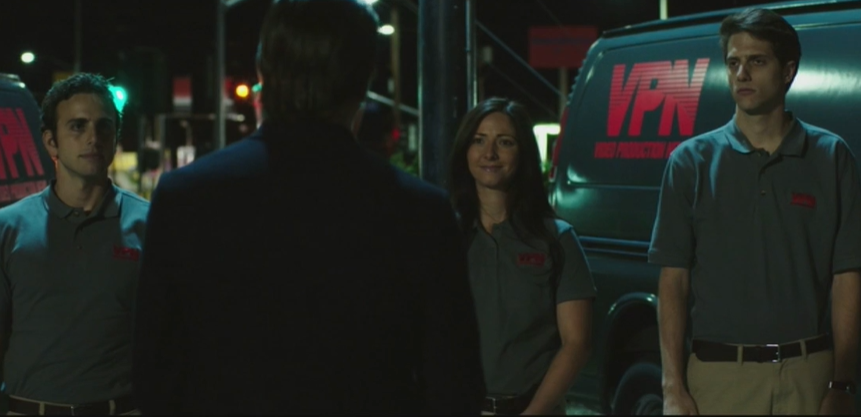
Perhaps, policing is not the right way to go about dissuading people’s hunger for power. However, with the recent ethical leaps that entrepreneurs such as Elon Musk (massive downsizing of X) show a side of capitalism that can cost the average working dreamer like ‘Rick’ a lot.
Maybe even one’s life.
Conclusion
Lou Bloom is terrifying not because he is monstrous, but because he is logically efficient. Every impulse is analyzed, every relationship (including his own sense of self) becomes transactional, every risk counts if it serves the shot, the sale, the frame.
He is not merely evil. He is method. There is a general extremity of traits that many people admire in moderated form (confidence, ambition, discipline). Lou also follows a seemingly logical conclusion: intelligence without empathy; grandiosity grounded in achievement; emotional distance masked by precision; risk felt but always rationalized.
In Lou Bloom, we see not only a character but a mirror: to what the world can reward, what ambition can cost, and what it looks like when someone builds their identity out of business-rules rather than human connection.
I am a Clinical Psychologist and a Lecturer of Psychology at Government College, Renala Khurd. Currently, I teach undergraduate students in the morning and practice psychotherapy later in the day. On the side, I conjointly run Psychologus and write regularly on topics related to psychology, business and philosophy. I enjoy practicing and provide consultation for mental disorders, organizational problems, social issues and marketing strategies.

